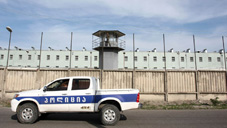
ECHR releases verdict on murder of prisoners in 2006
By Natalia Kochiashvili
Friday, April 3
The European Court of Human Rights (ECHR) has ruled that Georgia must pay ˆ80,800 to the families of 2 inmates, killed during a riot in Georgian prisons back in 2006, under the United National Movement rule. The case ruling was published yesterday in Strasbourg.
According to the court, the right to life was violated in both cases and the incident was not investigated properly.
The Ministry of Justice of Georgia says that the case is related to the so-called ‘criminal case’ of March 27th, 2006, at Prison N.5. The prisoners Zurab Kukhalashvili, 23, and Arsen Bukhrashvili, 29, died of multiple deadly wounds received during the prison riot as a result of the chaotic shooting by machine guns fired by members of masked special forces in the yard of the prison N.5.
The applicants were Sofio Kukhalashvili, Marina Gordadze, the sister and mother of Kukhalashvili, and Rusudan Chitashvili, the mother of Bukhrashvili..
“Both men were prisoners in Tbilisi Prison N.5 who died during a police anti-riot operation at the prison in March 2006,” the Court said.
According to the statement, released by the Justice Ministry, so-called prison riot preceded the brutal beating of prisoners GA and ZV on March 27th, 2006, by then head of the penitentiary department, Bachana Akhalaia, causing a stir among the inmates. The European Court ruled that the use of force in suppressing the unrest was taken by Akhalaia, Justice Minister at a time in agreement with the general administration.
The ECHR says that the anti-riot operation took place after disturbances when the authorities removed 6 alleged high-profile criminal bosses and their close associates from a prison hospital.
The judgement reads that the authorities’ aim was to reduce the criminal bosses’ alleged influence in the prison system but as they were removed by force, disturbances broke out in 2 nearby prisons, Prison N.1 and N.5. The authorities subsequently used an anti-riot squad to bring under control the disturbances in Prison N.5, where the rioting was particularly bad. “The incident led to the death of 7 inmates and the injury of 22 inmates and 2 prison officers.” reads the report.
In this case, the ECHR found that there had been a violation of right to life both in substance and in procedure.
For the substantive part of the right to life (prohibition of deprivation of liberty), the Strasbourg Court ruled out that on March 27th, 2006, the so-called riot-suppressing operation, organised by Bachana Akhalaia, was planned and implemented in a way that was uncontrollable and the force used was indiscriminate and excessive. In particular, it was found that there was “no attempt to use lighter means to minimize the damage.”
Besides, the injured were not provided with proper medical care. Moreover, excessive force was used during the special operation and those prisoners who were not resisted at all were killed in their cells.
As for the procedural part of the right to life (the obligation to conduct an expeditious and effective investigation), the Strasbourg court negatively assessed the fact that the investigation into the case only began in June 2006, which was too late and made it impossible to gather much important evidence. Moreover, the same body (the Department of Corrections), which carried out a riot suppression operation, was investigating the disproportionate use of force.
The Strasbourg Court also noted that the investigation did not examine the facts of the planning of the special operation and the use of lethal force. Furthermore, family members of the deceased were not granted victim status and did not enjoy the necessary procedural rights. Therefore, ECHR concluded that the investigation was ineffective, delayed and didn’t comply with the standards of independence and impartiality, therefore violating the procedural part of Article 2 (right to life) of European Convention.
Moreover, according to the Ministry of Justice, the Strasbourg court also dismissed the fact that, notwithstanding the significant shortcomings of the investigation, then-convened Parliament did not investigate such a massive incident, which ‘shook the country and found exceptional international response.’
In view of aforementioned violations, ECHR has ordered that Georgia must pay ˆ40,000 jointly to the first and second applicants and ˆ32,000 to the third applicant in respect of non-pecuniary damage.
In addition, Georgia must pay ˆ5,400 to the first and second applicants jointly and ˆ3,400 to the third applicant in respect of costs and expenses.
The judgment published on the website of the Strasbourg Court reads that the applicants argued that the responsibility for the death of their relatives lay with the State and that the State had failed to conduct an effective investigation. The applicants appealed to the Strasbourg Court in 2007 - 26 January and 14 August.


